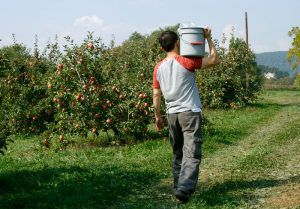January 31, 2022
Brian Pasternak, Administrator
Employment and Training Administration
U.S. Department of Labor
200 Constitution Avenue NW, Room N–5311
Washington, DC 20210
Re: Employment and Training Administration, Department of Labor, Docket Number ETA-2021-0006
Dear Administrator Pasternak:
On behalf of Pennsylvania Farm Bureau (PFB), the state’s largest general farm organization, I am writing to submit comments related to Docket Number ETA-2021-0006 regarding the Department of Labor’s Proposed Rule on the Adverse Effect Wage Rate Methodology for the Temporary Employment of H-2A Nonimmigrants in Non-Range Occupations in the United States. We appreciate the opportunity to submit comments and urge the Department of Labor not to promulgate a final rule based on this proposed rulemaking.
U.S. agriculture faces a critical shortage of workers each year, as the industry encounters challenges securing domestic labor. An increasing number of farmers have turned to the H-2A program to meet labor demands, however the H-2A program can be challenging to use. Additionally, barriers prevent farmers from using the H-2A program including the requirement to pay the Adverse Effect Wage Rate (AEWR). The AEWR has long been a concern for those farmers that utilize the H-2A program and the Department’s proposal to change the methodology used to calculate the AEWR is especially concerning. This proposal will have significant financial impacts on farmers, and place an additional administrative burden on farmers as well.
Pennsylvania Farm Bureau supports the comments submitted by the American Farm Bureau Federation (AFBF) to this docket and asks that this support be noted as part of the comment record. AFBF thoroughly covers Farm Bureau concerns with this proposed rule, however, a few points in particular are highlighted below:
- The proposed rule fails to consider the drastic increases in the AEWR over the last five years. Pennsylvania’s AEWR, for example, increased 10.6 percent from 2021 to 2022, and 27 percent from 2017 to 2022. There also appears to be no attempt to incorporate the realities of the market, or the ability of agriculture to absorb increasing labor expenses.
- The proposed rule would keep the single AEWR for the majority of field and livestock workers represented by six Standard Occupational Classification codes, while shifting AEWR determinations to the Department’s Bureau of Labor Statistics Occupational Employment and Wage Statistics (OEWS) survey for all other occupations for which the FLS does not adequately collect or consistently report wage data at a state or regional level. Per the Department, this is because of concerns that using a single AEWR for all H-2A workers may adversely affect wages in certain occupations. However, since the lack of domestic workers to fill these positions has contributed to the growth of H-2A, Farm Bureau disagrees with the idea that the disaggregation of occupations is necessary to prevent an adverse effect. Farm Bureau also disagrees with the decision to utilize the OEWS data for all other H-2A occupations except for the six SOC codes reported by the FLS. This is because the OEWS does not represent the intricacies unique to the agriculture industry or include sufficient participation from farm employers in the data collection process.
- In the proposed rule the Department does not adequately describe the economic impact of the AEWR. Labor costs on farms, especially certain labor-intensive agricultural operations, such as nursery and greenhouse, fruit trees, and vegetable and melon operations are substantial – and this is important since these segments of agriculture tend to employ H-2A workers.
- The proposed rule would also cause planning challenges for farmers who use the H-2A program, since the wage determinations for occupations set by the FLS and the OEWS are published at different times throughout the year. There are also additional concerns about employees receiving wage increases at varying times, creating potential relationship issues among H-2A workers.
As stated above, this proposal will have significant financial impacts on farmers, and would place an additional administrative burden on farmers. Securing a reliable and competitive workforce for our nation’s farms is essential for a healthy Pennsylvania economy – and a national economy as well. Promulgating this rule will further challenge those farmers who must utilize the H-2A program.
Sincerely,
Rick Ebert, PFB President

